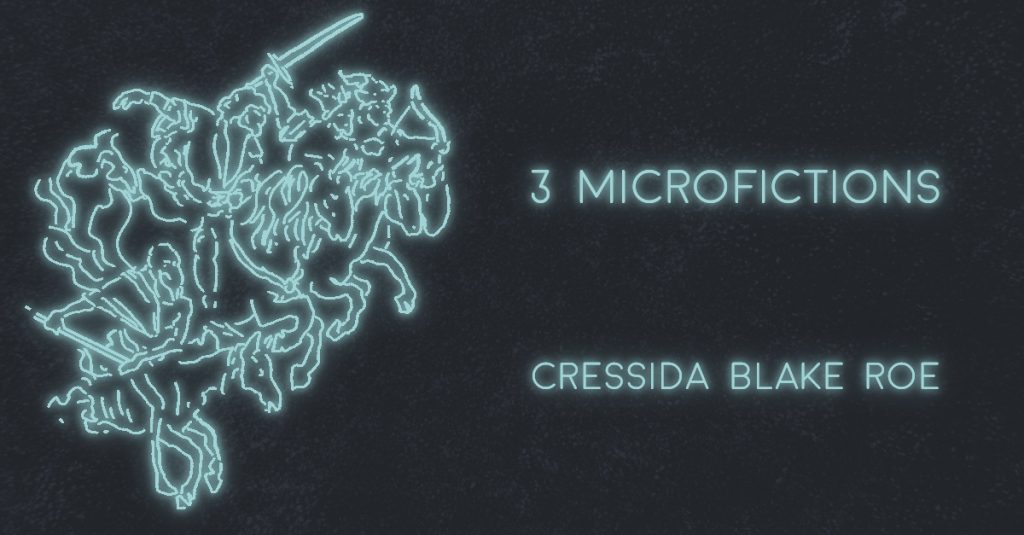
THREE MICRO FICTION PIECES by Cressida Blake Roe
Apocalypse Needs a More Exciting Plural Form
Proposition One:
The plural form of apocalypse isn’t nuclear fallout, environmental degradation, contagions, Horseman, acts of God, or St John’s Revelations. Instead, it sounds more like a woman fleeing in broken counterpoint to the screech of subway brakes and takes the shape of a fist slamming through a wall two inches from a child’s head: finales too small for the tabloid headlines, too colossal for folding away between pages, out of sight.
***
The train didn’t stop in time. They said she didn’t mean to die. Her husband thought, in front-page letters three inches high, that she always seemed perfectly happy. He didn’t know her nightmares, when she drowned in sealed vessels feeling less afraid of the water’s weight than the sharps of the sky. The sky strikes down, opened hand/closed hand. Nobody asked how many times the hand struck before. The child dreams of his father’s eyes staring out from the hollows of gun barrels, and the bullets whiz toward him, too slow for mercy.
Proposition Two:
The plural form of apocalypse is a paradox, implying a multiplicity of ends to worlds that can only end once. Only so many parallel universes can exist. Discarded cataclysms shake hands, murmuring with low voices in the slush pile of the gods. They were not violent, heartrending, pyrotechnic, pretty enough to make the cut. Better luck next time. But only so many worlds demand obliteration.
***
The moon crawled out of the mountain just after midnight, and the first people who had awoken pointed up at the slanted horizon.
“What dread god had arisen?” we asked ourselves. “What power comes to glare down with its cold eye?”
No one has answers. We drown our faces in the pond to drink its milky excrescence and punish the river that shatters its shadow. We open our wrists and drain the blood so that the land runs red and silver, loving this newly minted god the way the rain loves the soil.
Proposition Three:
The plural form of apocalypse invites destruction déjà vu, wearing the mask of innovation: a banality of hatred opening the same chambers and igniting the old fires. Leviathans press at the surface and leer, flooding the womb and crunching the sun in their teeth. In these days that are ending, each forged beginning chokes its hold and calls this gasping silence gratitude.
***
We unhinged our jaws to their fullest extent so that we could devour those who had and those who fed themselves on those who had not. We filled up the gaps in what had burned. If the world insists on forgetting our bodies, shoring up structures of good that would not otherwise remain, then perhaps it will overlook the traces of blood left behind, the bone shards, the tears of children in empty schools and parking lots, the mothers who lost their mothers, those who were no longer able to breathe.
Spooky Action at a Distance
And for now we are, indeed, here: six hours from sunrise.
The wheels rattle on towards tomorrow, and arrival. Until then, we sit in the lamplight glare and reflect on the meaning of terror, white-masked and waiting just behind us, a little out of sight. Perhaps the railroad ties will contradict the past, rushing away in the dark. Once, I asked you for a cigarette, but the smoke, wreathing in new patterns, intercepted the message. Six hours from sunrise, but nothing ever changes. Once, you asked to feel my edges, torn and fibrous from too much handling by those less considerate, used into an illusion of comfort. Have I said how I hate the presumption of nostalgia, wielded by old women? You cannot respond, weeping iron tears that do not fall. Six hours from sunrise, and nothing will ever change. No, you say at last, understanding the futility of this rattling, toward a destination that neither hell nor heaven can declare. Curling memories lie damp all around, rotting with the slow ceremony of forgiveness. I wished I could touch you in return—you, who I address as though such a distinction could alter this journey. But my absent face cannot communicate these desires, and they slip between the lines of light, lost. Terror watches through broken eyes and considers. Outside, in the rattling dark, we are six hours from sunrise.
And for now, we are, indeed here.
A Brief Treatise on the Unreliability of Memory
You taught me to speak of myself in the third-person, as though life were a story that could be rewritten.1 Anonymity lifts the weight of four letters branded across her breasts: SLUT, bullet syllable shot back and forth across her battlefield body and never reaching anywhere,2 when the dismembered diagnosis of language bears no resemblance to the possibility of a cure.3 In the third-person, she wrote a poem.4 In the second-person, you write a letter.5 In the first-person, I am still trying to understand why hope feels like such an indefinable burden to carry.6
1 He seduces her, in one version. In another, tree roots no longer scar the ground & she suffocates on dreams
2 deep in sleep’s ivory box, where her mother tongue suggests how lucky it was that he was such a good guy.
3 Symptoms remain untreatable except by passing apologies in counterfeit coin, love honed on an edge pure enough to cut men away.
4 The poem is a life that never ends. What sounds true only becomes a lie about somebody else
5 addressed to a ghost that refuses to exist in a post-trauma reality. She never learned how not to ask for justification,
6 sexless & obscure, taken from strangers with the same imperfect excuses.
